
The letter is addressed to Federica Mogherini, the newly appointed EU High Representative of Foreign Affairs and Security Policy, Vice President of the European Commission. Mogherini’s first formal trip outside the EU was set to the occupied Palestinian territory and Israel where she emphasised her support for a peaceful negotiated two-state solution.
The letter urges “a coherent and comprehensive EU policy framework based on defence of international law” and suggests the EU to undertake six concrete actions.
16 January 2015
to: Mrs. Federica Mogherini, EU High Representative of Foreign Affairs and Security Policy, Vice President of the European Commission
cc: EU Foreign Ministers; EU Heads of Mission in Jerusalem; EU Representative in Jerusalem
re: EU policy and practice in the occupied Palestinian territory
Dear Mrs. Mogherini,
Congratulations on your appointment as High Representative of the European Union for Foreign Affairs. You are taking on this role at a challenging time, but also at a time when the EU has the capacity to facilitate real change in the Middle East.
As international humanitarian and development NGOs working in the occupied Palestinian territory and Israel (OPTI), we greatly appreciate your prioritization of the situation in OPTI, and that your first trip outside the EU was to come here and emphasize your support for a peaceful negotiated two-state solution. Unfortunately, this is increasingly urgent as the conditions essential for the EU’s stated objective of a viable two-state solution are rapidly vanishing. For the EU to have a meaningful impact in this conflict, to the benefit of civilians on all sides, it must proactively, and consistently, work to prevent the continued deterioration of the situation, to ensure that the parties comply with international humanitarian law (IHL), to bring an end to the occupation and to ensure that the underlying conditions on the ground will allow for a sustainable resolution of the conflict.
Since the most recent round of negotiations broke down, Israel has announced 3860 new settlement units, the largest announcement of settlements in 30 years. Israeli settlement construction is a direct violation of international law as recognized by the EU, and results in further breaches of international humanitarian law, including the demolition of Palestinian homes and property, leading to increased numbers of Palestinians forcibly displaced from their homes. In 2014 alone Israel has demolished a total of 600 Palestinian homes or structures across the West Bank, including in East Jerusalem, displacing 1215 people - a 10 percent increase from 2013. 118 of the demolished structures were donor funded, including 49 funded by European donors.
This last year we have also seen the devastating toll of the conflict in Gaza. 2,205 Palestinians were killed, including at least 1,483 civilians, of whom 521 were children, and 71 Israelis were killed, including four civilians. At the same time, Israel’s “separation policy” continues – cutting the Gaza Strip and the West Bank off from each other. Since the 2014 Gaza war, there has been no change to the blockade, preventing movement of most people and goods between the Gaza Strip and the West Bank. This blockade is a breach of the law of occupation under the Fourth Geneva Convention and continues to serve as a major obstacle to post-conflict reconstruction and to ensuring the basic needs of the population are met. UNOCHA recorded that only 287 trucks of construction materials entered the Gaza Strip during the entire month of November, whereas a minimum of 735 truckloads of construction materials is needed per day to complete reconstruction within three – five years. While this did increase slightly in December, it is nowhere close to meeting the needs, and at the current pace it will take generations to rebuild.
Finally, we are concerned at the lack of progress towards an effective and representative Palestinian unity government that can serve the interests of the entire Palestinian population.
It is time for the EU and its member states to step up and take a leading role in ending the occupation and bringing about a durable resolution of the conflict, as you have indicated you want to see within your term. EU practice must be aligned with EU policy if the EU’s significant and generous contributions to Palestinian welfare are to have their desired impact. As the recent EuropeAid evaluation report noted, “the current Cooperation paradigm has reached its limits in the absence of a parallel political track that addresses the binding constraints and more effective implementation measures”. The parties must be incentivized to act in full respect of their obligations under international law and refrain from any action which harms civilians on either side or contributes to the further erosion of the potential for a viable Palestinian State.
A coherent and comprehensive EU policy framework based on defence of international law is urgently needed. We are counting on you to lead this effort. We strongly suggest that the EU takes steps to demonstrate that close association with Europe is contingent upon compliance with international law, and that actions which violate IHL and/or undermine the conditions on the ground necessary to resolve the conflict under the criteria the EU has repeatedly outlined will have consequences. We therefore suggest the EU needs to undertake the following actions:
- Outline a coherent and comprehensive EU policy framework based on defence of international law. Rather than calibrating EU policy to the ups and downs of political dialogue on the peace process, the EU and its member states should base their policies, diplomacy, and actions on the actual conditions on the ground which underpin the viability of a peace process, responding consistently to violation of international law by all parties.
- Ensure that the EU recognition of Israel within the context of the 1967 borders (as is stated EU policy) underpins all EU-Israel partnership discussions. This is an important step to ensure the EU is not supporting activities in the West Bank that are in violation of international law and continue to have a negative impact on the lives of Palestinians.
- Reiterate clear red lines around settlement expansion, demolitions and forced displacement and articulate clear repercussions if these red lines are crossed. This should include demanding a comprehensive settlement freeze and cancelling all outstanding tenders to build further settlement units as well as pressing the government of Israel to end all demolitions and evictions (both administrative and punitive) in the West Bank, including East Jerusalem and cancel all outstanding demolition orders.
- Challenge Israel’s illegal implementation of the Separation Policy, recognising the strategic necessity of Gaza to a viable Palestinian State, in accordance with EU policy. In this regard, the EU should demand an end to the blockade, and condition EU bilateral relations with the Government of Israel on progress toward such an end. The EU should also insist that Israel find and implement technical solutions wherever possible for access to and from Gaza, including facilitation of rapid progress on reconstruction, focusing on reversing the impact of the blockade on the civilian population. While Israel has legitimate security concerns, these cannot continue to be addressed at the expense of the civilian population.
- Reiterate the importance of unimpeded and rapid humanitarian relief to both Gaza and the West Bank, including East Jerusalem, including halting the demolition of EU-funded aid projects. In particular, timely and extensive progress on reconstruction in Gaza is necessary to ensure stability in a context of rising dissatisfaction and prevent a return to conflict.
- Continue to offer clear support to the Palestinian national unity government as one of a number of essential steps towards reinvigorating a Palestinian leadership with democratic legitimacy representing all Palestinians.
EU leadership is essential to bringing about the necessary change in the situation on the ground, to enable a peaceful and prosperous existence for Palestinians and Israelis. We look forward to the opportunity to discuss these matters further with you, either via our representatives in Brussels or on your next visit to the region. We wish you every success in your endeavours.
*This letter was signed by 32 international aid, faith, and development agencies working in the occupied Palestinian territory



